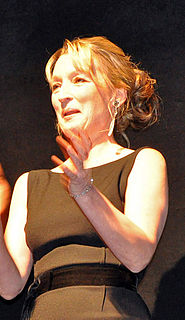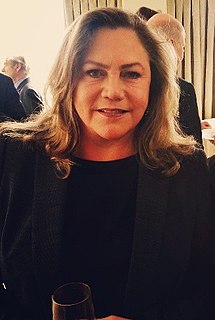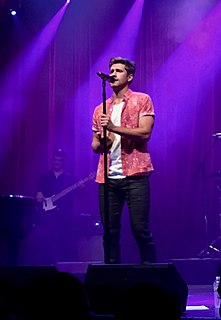A Quote by Bill Hader
I was never that good on stage with live improv. I was much better on film or writing something and then thinking about it. I was too in my head when I was on stage.
Related Quotes
I always had something to think about or draw from, which as an actor is a gift. The beautiful thing about film is that it gets so much closer than stage. I love stage and that's what I started doing and it's a beautiful art form in of itself, but in film you can move your eyes to the side and somehow the audience can fill in the blanks of what you're thinking.
Stage is the ultimate test; I like watching established screen actors on stage to see if they can really do it. But it's great to have a healthy mixture of the two. Film is so technical: there's something very particular about the relationship between you and the camera. It took a long time for me to get good on film.
One of the things I do tell young women, if they want to pursue a career in acting, is to get good stage training. It is essential to have a good basis in stage technique. You can move into film easily, and acquire more skill and more understanding, but you can't necessarily go the other way around. For women, longevity of career will very much be on stage.
Plays are literature: the word, the idea. Film is much more like the form in which we dream - in action and images (Television is furniture). I think a great play can only be a play. It fits the stage better than it fits the screen. Some stories insist on being film, can't be contained on stage. In the end, all writing serves to answer the same question: Why are we alive? And the form the question takes - play, film, novel - is dictated, I suppose, by whether its story is driven by character or place.
I can feel how an audience is reacting when I'm on a stage, but when you are on stage, your perception is distorted. That's something you just have to know. It's like pilots that fly at high Gs and they lose, sometimes, consciousness and hand/eye coordination and they just have to know that that's going to happen. They have to be trained to not try to do too much while they are doing that. So when you are on stage, you have to be aware that you are wrong about how it feels a lot of times.
That's the thing about stage: It's something you can't find anywhere else. It's a two-and-a-half, three-hour experience, and it's a real relationship. You're sending out energy from the stage, but the audience is giving you back so much also, so that's also lifting you and pushing you forward as you're performing and giving you so much energy. You can't find it anywhere else, and that's why people get addicted to being on stage, and when they're not on stage are kind of looking for that and constantly searching for it.
An improv artist's best instrument is their ability keep their antennae clean so they're able to receive what I call the connection to creativity. It's the thing that you see in any amazing moment that any human being is performing. Whether it's watching Michael Jordan navigating through all these attackers and then suddenly rising up and putting the ball in the most amazing way, or watching an actor on stage playing Shakespeare, but not thinking about the actor anymore or the stage or you or the chair, any of these kinds of moments of transcendence.




































